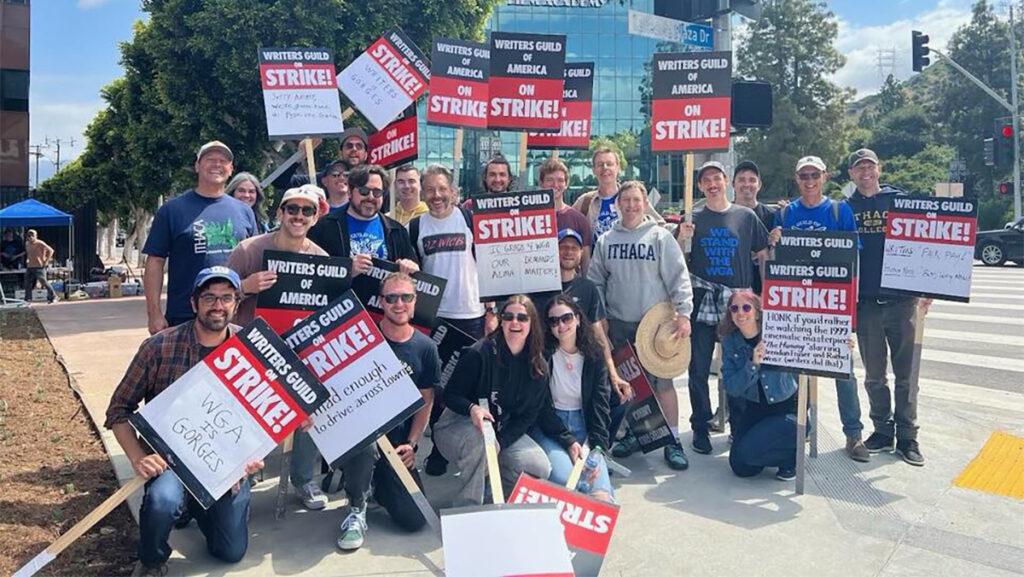Amid the height of the Writers Guild of America strike, some students at Ithaca College, who are hoping to enter film and media careers, stand in solidarity with members of the guild, as the outcome of the strike can affect their futures in the entertainment industry.
Back in May, some students at the Ithaca College Los Angeles program attended a picketing to support the college’s alumni who are members of the west coast branch of the WGA, a labor union that supports writers for news, television, movies and other media. The writers strike first started May 2 after the WGA was not able to negotiate its upcoming contract renewal with the Alliance of Motion Pictures and Television. The WGA requested increased pay, better healthcare and better overall treatment. Additionally, the use of Artificial Intelligence along with the emergence of streaming services was discussed as well. However, the AMPTP rejected these proposals, according to a document from the WGA, on May 1.
Several late-night talk shows, like “Jimmy Kimmel Live!” on ABC, and scripted shows, like “Stranger Things,” have stopped production as many of the writers, actors and directors protest against the AMPTP until an agreement is made.
Mike Royce ’86, screenwriter and television producer, said the strike is jeopardizing the livelihoods of many writers because they are not getting paid as the strike continues. He also said that it has brought the entertainment industry together and that he is impressed by the amount of support from actor and director unions.
“I think it’s all coming from the fact that all of us now in every entertainment union are feeling the effects and getting screwed by these companies,” Royce said. “We’re all in the same boat now and so we have to support each other and sit together. Not just writers but everybody who works in entertainment, in order to stop this takeover that’s laying thousands of people off and reducing the salaries of everybody.”
Steven Ginsberg, associate professor and Pendleton chair for the ICLA program and a member of the WGA, said he understands the concerns writers have over the emergence of streaming platforms and AI in the industry. He said these concerns have to be taken seriously so that writers are getting the proper compensation for their work.
“I don’t think that anything the writers are asking for is outrageous,” Ginsberg said. “Especially in comparison to the billions of dollars that [Los Angeles] is making. We live in a capitalistic society and that’s a reality and that’s fine … but people want a fair shot for the amount of work they do. So, it’s pretty simple really.”
During the ICLA program students can participate and earn credit in either the spring, fall or summer semesters during their junior and senior years by interning at a company or organization.
Jack Bryant, associate professor and program director of the Department of Media, Arts, Science and Studies, said via email that while the strike will affect internships opportunities from now until the end of the strike, he hopes the outcome will produce a better outcome for students who aspire to work in the entertainment industry.
In the short-term, it’s conceivable that some internship possibilities could be affected if the strike goes on long enough,” Bryant said. “However, if the strike is successful and the demands of the WGA are met, students who aspire to work in the industry will hopefully be in a better position to support themselves financially and to have greater job security in their careers.”
Dylan Clark ’23 interned at Ghost House Pictures and said he noticed how his company was reacting to the strike before he ended his internship. He also said he is interested to learn how the company is currently doing.
“There was this mad dash right before the strike where they were trying to get final revisions done with the writers so that they can get as much time as they could before this hiatus period,” Clark said. “Once the hiatus period began, I think they started shifting our attention to the projects that they could keep working on … that aren’t interfering with the strike.”
Surina Belk-Gupta ’23 said she witnessed her entire department at the Jim Henson Company preparing to handle the strike, as many productions started shutting down during her last two weeks as a feature film development intern.
Belk-Gupta said she is planning to move back to Los Angeles in July despite the difficulties in finding work postgraduate because she wants to see the industry change and supports the people fighting.
“I don’t think anyone would say that they’re happy about it because it sucks. … All of us are out of jobs and striking,” Belk-Gupta said. “I’m happy that it has as much support as it does and it actually did shut down the industry. As miserable as it is that [the strike] had to happen, I’m glad that it did because it’s so important, and it’s so horrifying how writers are being treated.”
Senior Kaitlyin Coffey, who is attending the ICLA program over the summer, said she was lucky enough to secure an internship at Misher Films back in January but was initially concerned about losing it because of the strike. However, Coffey said the company has done its best to navigate the difficulties of working during a strike.
Coffey also said writers need to be paid fairly, especially in the world of streaming.
“I think these big streaming companies have underestimated the value of these writers and I think they need to reckon with the fact that these writers are extremely valuable and extremely important and should be compensated as such,” Coffey said.
Senior Matt Surridge, who is also currently enrolled in the ICLA program, said he is interning at a camera and production equipment renting company called Evidence Cameras. Since the start of the strike, Surridge said the company has seen a decrease in rentals and is grateful to end up working in technology as opposed to working in development.
Additionally, Surridge said he is surprised how long it took for the strike to happen, as he believes that some of the unmet demands surrounding streaming during the previous strike back in 2007–2008 have carried through into the 2023 strike.
“I think it’s time for [the strike] to happen,” Surridge said. “Honestly, [in] the way streaming was going, I think it would have become a very harsh environment, a very much rougher environment to strike in if they hadn’t done it now.”
The Directors Guild of America was able to land a tentative deal with the AMPTP that covers workers wages and hours as well as regulations of AI, which was something that WGA was pushing in its contract.
Though there is not a clear indication of when the strike will end, Belk-Gupta said the students that will be a part of the next few ICLA programs will gain valuable experience for being able to witness the strike in person the same way she did.
“I think, regardless, it’s going to be a deeply educational time,” Belk-Gupta said. “So even if it’s like an unprecedented and a little bit scary time to be going to LA, it’s also a deeply educational one. I actually feel very grateful that I got to witness something so interesting and learn about it and learn how it works.”














